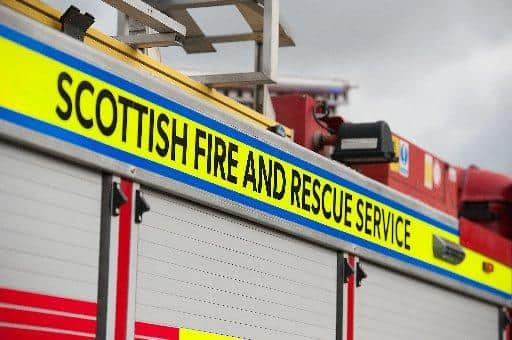Firefighters' bid to cut down on false alarms in Falkirk area continues
and live on Freeview channel 276
According to the service, around 64,000 hours of firefighters’ time every year is needlessly spent checking out false alarms from workplaces.
SFRS mobilises on average two fire appliances and nine firefighters to each of the 28,479 false alarms – this equates to around 57,000 unnecessary blue light journeys annually.
Advertisement
Hide AdAdvertisement
Hide AdMost alarms in the Falkirk area – and the rest of the country – are activated by faults or other causes like steam or burnt food, with only two per cent actually involving a fire, most of which are put out before the arrival of crews.


These figures have been shared by SFRS as part of its consultation on how to safely reduce call outs to false alarms – also known as Unwanted Fire Alarm Signals (UFAS).
Assistant chief officer Stuart Stevens says businesses have a key role to play in reducing these figures.
He said: “The advantages of getting duty holders to accept their legal responsibilities and reducing these callouts are clear. Making this change means we can free up firefighters’ time, be even more responsive in genuine emergencies and use SFRS resources more effectively.
Advertisement
Hide AdAdvertisement
Hide Ad“These unnecessary blue light journeys bring risks to our crews, other road users and pedestrians as well as impacting the environment with an estimated 575 tonnes of carbon emissions produced – the equivalent of heating 230 homes a year.
“Businesses will also experience less disruption as they no longer need to wait for us to attend to give the all clear after a false alarm.”
The 12-week consultation – which seeks views on three proposed options – is underway and while early analysis is encouraging with many members of the public taking part it also indicates a low response rate from the businesses and workplaces that are potentially most affected by the proposed changes.
One of the option being looked at would see operations control staff call challenge automatic fire alarms from non-domestic premises. In this option, no response will be mobilised, if questioning through call challenge confirms there is no fire, or signs of one.
Advertisement
Hide AdAdvertisement
Hide AdAnother option being considered is non-attendance to automatic fire alarms from non-domestic premises, with control staff advising the caller the fire service will not attend unless a back-up 999 call confirming fire, or signs of fire is received.
Assistant chief officer Stevens said: “It may be that these businesses and organisations are taking their time to fully consider the proposed options and I’m also aware last month we were just coming out of a holiday period.
“This is why we’re issuing this appeal for those most affected to take part in the consultation and play their part in helping to shape the future response model. Each of the options, which have all been risk assessed, will see a significant reduction in the number of UFAS calls we attend.”
The consultation document Time for Change: Reducing Unwanted Fire Alarm Signals and related survey can be accessed on the website until Monday, October 11.
Advertisement
Hide AdAdvertisement
Hide AdA report based on the consultation responses – including a preferred option – will be considered by the SFRS Board in December.
Thank you for reading this article on our free-to-read website. We're more reliant on your support than ever as the shift in consumer habits brought about by Coronavirus impacts our advertisers.
Please consider purchasing a subscription to our print newspaper to help fund our trusted, fact-checked journalism.
Comment Guidelines
National World encourages reader discussion on our stories. User feedback, insights and back-and-forth exchanges add a rich layer of context to reporting. Please review our Community Guidelines before commenting.
